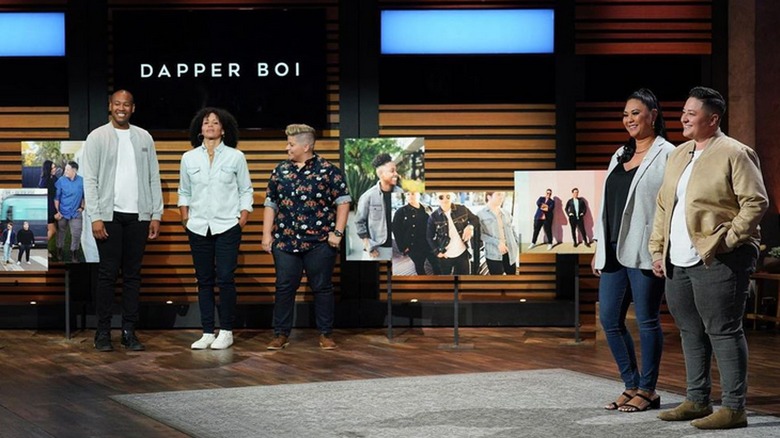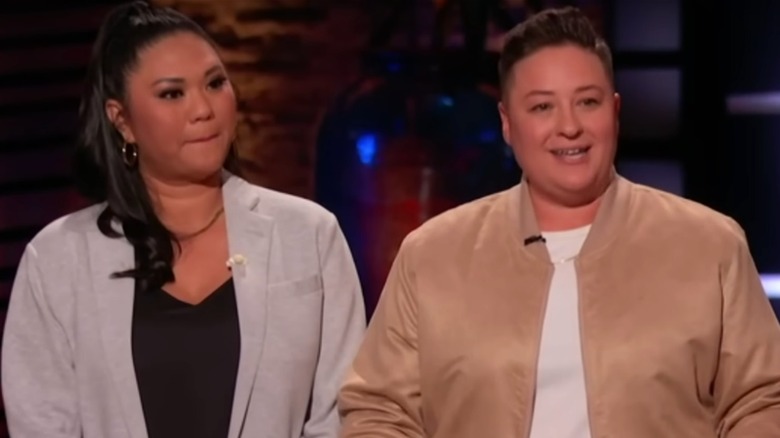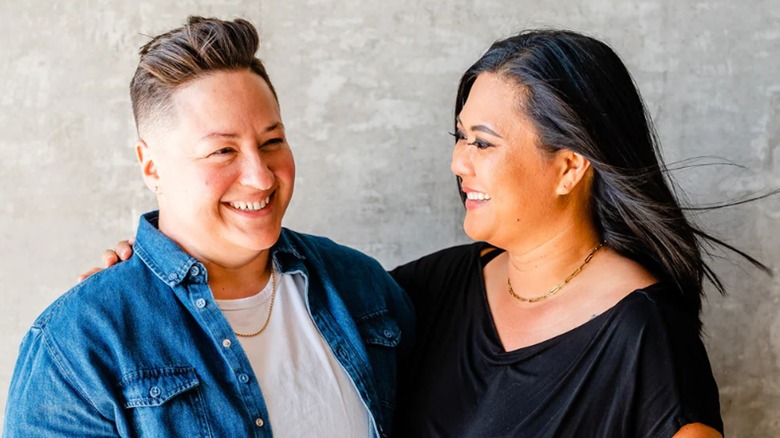Here's What Went Down With Dapper Boi After Shark Tank
We may receive a commission on purchases made from links.
Vicky Pasche had long been disillusioned with the lack of inclusivity in retail fashion. Aside from the difficulty of finding clothes that fit her well and make her feel comfortable, shopping in either the women's or menswear section inevitably earned looks from both shoppers, on top of feeling "frumpy" and unseen by any brand.
She knew she wasn't the only one who felt this way. Clothing is a basic human need, yet the majority of fashion brands still don't cater to non-sample-size shoppers. (Journalist Elizabeth Segran revealed to Marketplace that most retail companies still offer only as far as size 16.) She also found the selections for gender-neutral pieces limited. Hence, she and her wife Charisse decided to create a clothing company that provides what Vicky and a huge sector of the market needs.
They established Dapper Boi in 2015, thanks to a Kickstarter campaign that raised $26,000. By introducing collections of items for pre-order at a 50% margin, the brand was able to create a sense of urgency among shoppers and build an audience of repeat customers. With 51% of shoppers coming back to purchase new items, Dapper Boi's lifetime sales reached $3.5 million in 7 years. To expand the brand, the founders appeared on "Shark Tank" in April 2023 asking for $250,000 in exchange for 5% equity. However, as enthused as the Sharks were with Dapper Boi's mission and growth, none of them took the bait to invest in the end.
What happened to Dapper Boi on Shark Tank?
The Pasches' pitch initially went well. They defined their brand's mission with the statement, "The shopping experience should be based on style preference and body type, not gender ... Isn't it time that we all fit in?" The investors were impressed with Dapper Boi's numbers, including its $1.2 million sales in 2022. Vicky said the company isn't opposed to convincing retailers to create a third category for gender-neutral clothes to accommodate them but for now, with mission-driven branding, they're sticking to direct-to-consumer selling.
However, COVID-19 "killed" their manufacturing pace: From six to 10 weeks pre-pandemic, delivering pre-ordered products now takes six to seven months. Vicky's revelation that the company has only $60,000 in inventory and "about $100" on hand further dismayed the Sharks. Despite strong sales, allocating more than 30% of their budget to marketing left the company $460,000 in the hole. "It was a wrong attempt to try to expand ... but we were not ready," she admitted.
One by one, the Sharks opted out. FUBU CEO/founder Daymond John didn't understand why Dapper Boi wanted to be "everything to everybody" when it already has a strong community of repeat buyers. He pointed out how similar Dapper Boi is to FUBU's "for us, by us" concept and offered to be a mentor but not an investor. When Vicky insisted they wanted to fit in with everybody, Cuban said they weren't on the same page regarding the business and declined to invest.
Dapper Boi is sticking to its mission to be inclusive of everyone
Although Dapper Boi left the tank empty-handed, they shared the news through an Instagram livestream that they've actually found an investor: The morning of their "Shark Tank" shoot, the Pasches signed a $250,000 investment from Alternative Wealth Partners' Kelly Ann Winget who understood what they wanted to do. During the live stream, Vicky underscored how less than 2% of venture capital goes to women-owned businesses and less than 1% goes to LGBTQ+ founders. "The mission is so much bigger [than us]," she said.
Charisse told Starter Story that aside from offering quality gender-neutral clothing that ranges from XXS up to 4XL for tops and from size 26 to 52 for bottoms, their brand creates relatable content featuring a diverse array of body types and gender identities. Indeed, their "Dapper Boi Movement" music video was lauded by Advocate for "giving [people] all the feels" during Pride season.
In 2023, Alternative Wealth Partners reported that the brand had reached $4 million in sales, thanks to a 30,000-strong and highly diverse customer base, and a 71% repeat customer rate. It's also in the top 0.5% of the 2.2 million Shopify stores. The Dapper Boi app is available on Google Play and the Apple App Store, and the company also launched an augmented reality shopping experience (per Queerency). It currently has more than 50,000 followers on Instagram and 52,000-plus on TikTok.
What's next for the Dapper Boi founders?
Although 7.2% of Americans identify as members of the LGBTQ+ community, LGBTQ+ founders get only 0.5% of all funding. Still, when given the support, these entrepreneurs yield great results. "LGBTQ+-founded companies today create 36% more jobs compared to the average entrepreneur," Tarik Perkins of the accelerator program StartOut Growth Lab told JP Morgan, adding that their patent creation is collectively 114% higher than the average entrepreneur.
Despite the challenges of running Dapper Boi, the Pasches are set on growing the brand rather than staying within a conventional lane. Vicky told Advocate, "It's so much more than women that look like me — it's men who have curves, people that don't love shopping in the gender department they're assigned to. It's really just bringing attention to this kind of archaic way of thinking: because you're a woman you must shop here, and a man must shop here. We really try to go above and beyond those norms." She shared more of Dapper Boi's story, along with other visionary women founders, in the Fall 2023 documentary "Show Her The Money" and the Amazon docu-series "Outrageous." The couple also joined the business conference and entertainment festival Unleashed LGBTQ in September as part of their community-building and networking efforts. The Sharks may have told them, "No," but the Pasches are saying "Yes" to their vision. " ... [Our] story is still being written," they assured Queerency.


